As a marketer, you and I both know that conversational marketing drives results.
Maybe you’re looking for an AI chatbot that can capture leads like a top-performing ad or an AI agent that guides customers through personalized journeys that boost conversions and sales.
With so many tools out there promising results, how do you pick the one that best fits your strategy?
Enter Manychat and Botpress: two powerful chatbot building platforms for marketing.
Wondering which one deserves a spot in your marketing toolkit? Read our comparison of Manychat vs. Botpress to help you decide.
Quick Overview: Manychat vs. Botpress
TL;DR: Manychat helps businesses boost marketing and engagement through AI-powered conversations, especially on social media. Botpress is designed for building chatbots that can manage more complex, multi-step workflows, including marketing tasks and beyond.
Manychat is a no-code chatbot platform built for marketing automation on messaging apps. It shines on channels like Instagram, Facebook Messenger, and WhatsApp, where businesses can use it to run interactive campaigns and capture leads.
With pre-built flows and a visual drag-and-drop interface, it’s easy for marketing teams to launch campaign-focused bots without writing code.
Botpress is a conversational AI platform for building intelligent, multi-step chatbots and marketing agents. It goes beyond surface-level engagement by allowing bots to personalize conversations and execute complex workflows across channels.
With native support for integrations into CRMs and internal marketing databases, Botpress gives teams more control over how their agents act and automate tasks. It’s best suited for businesses that need a high degree of customization and integration across the entire marketing funnel.
Key Features of Manychat
- Visual flow builder for designing chat conversations and marketing automations
- Multi-channel support across Facebook Messenger, Instagram DM, WhatsApp, SMS, and email
- Growth tools like comment-to-message and QR codes for capturing leads
- Audience segmentation using tags and custom fields for personalized messaging
- Automation triggers for keyword responses and event-driven workflows
- E-commerce integrations with platforms like Shopify for order updates and product recommendations
- Built-in analytics dashboard for tracking engagement and campaign performance
- Pre-built templates for quick chatbot deployment across industries
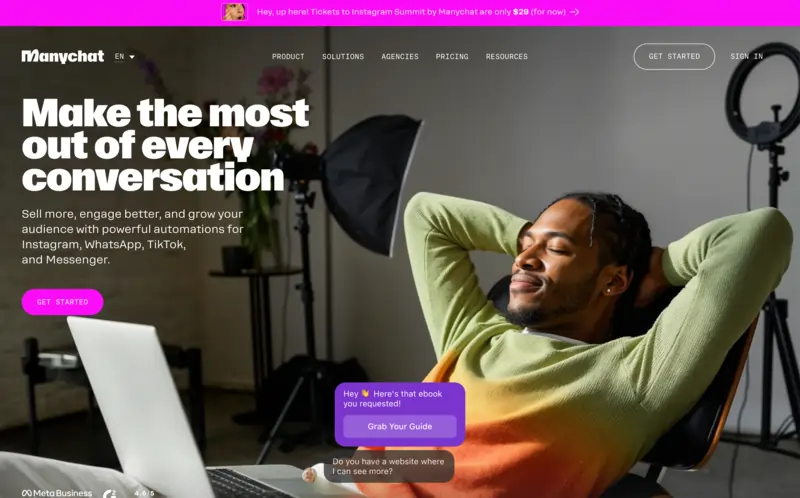
Key Features of Botpress
- Visual flow builder for designing complex conversations and workflows
- Unlimited integration options to connect with APIs, databases, and third-party tools
- Persistent memory to retain user context and conversation history across sessions
- Support for custom code execution for advanced logic and custom functionalities
- Choice of any large language model (LLM) for powering AI responses
- Role-based access control (RBAC) and enterprise-grade security features
- Built-in analytics and monitoring tools for tracking bot performance
- Active developer community and resources like Botpress Academy for support
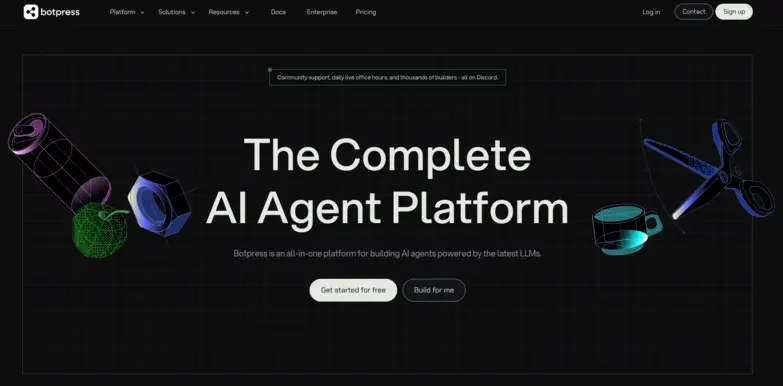
Feature-By-Feature Comparison
Manychat vs. Botpress Pricing Comparison
Manychat offers a free plan for users looking to test out the platform with unlimited custom flows to engage up to 1,000 contacts.
Manychat also provides two paid plans:
Botpress offers a free plan that includes $5 in monthly AI credits. These credits let users call large language models for free – something that typically comes with a cost, making it a valuable perk for teams experimenting with AI.
In terms of paid plans, Botpress has four paid plans:
Integration Capabilities
TL;DR: Manychat offers 10 pre-built integrations focused on marketing tools, while Botpress provides 190+ integrations and supports custom connectors for more complex, system-wide workflows.
Both Manychat and Botpress offer pre-built integrations, allowing AI chatbots built on either platform to connect with other tools and systems in a marketing or business workflow.
Manychat offers 10 pre-built integrations, making it easy to connect with popular marketing and sales tools like HubSpot, Mailchimp, Google Sheets, and Shopify. For example, Manychat users can automatically add new leads to a Mailchimp email list or update a Google Sheet with responses collected through a chatbot conversation.
Botpress provides over 190 pre-built integrations and also supports custom connectors for building unique integrations. Businesses using Botpress can connect to platforms like Salesforce, HubSpot, and Zendesk to verify customer details through API calls, update CRM records, or trigger complex workflows that involve multiple systems.
Use Cases
TL;DR: Manychat is a solid choice if the focus is on marketing through social media channels. Botpress is the better fit if teams are starting with marketing but also want the flexibility to build advanced bots that connect deeply with other business functions.
Manychat focuses on marketing while Botpress supports a wide range of business applications.
Manychat’s core strengths revolve around social media marketing, lead generation, and customer engagement. It’s designed for creating interactive conversations on platforms like Facebook Messenger, Instagram, WhatsApp, and SMS to capture leads and drive sales.
Businesses choose Manychat when they want a simple solution to engage followers on social channels and automate messaging without needing technical skills.
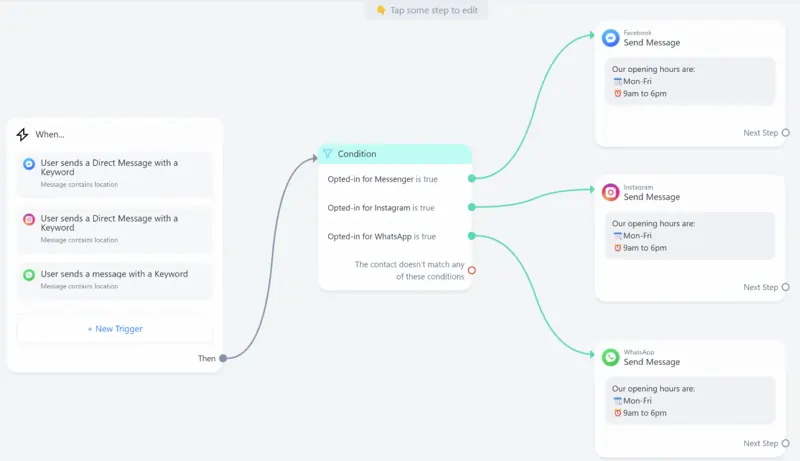
Botpress, while also able to support marketing workflows, is a horizontal platform built for a wider range of use cases beyond marketing. For example, Botpress can help with sales automation, qualifying leads by asking follow-up questions, scoring prospects, and integrating with tools like Salesforce to book meetings or move deals forward. Botpress is well-suited for creating AI agents that handle complex workflows across different business functions.
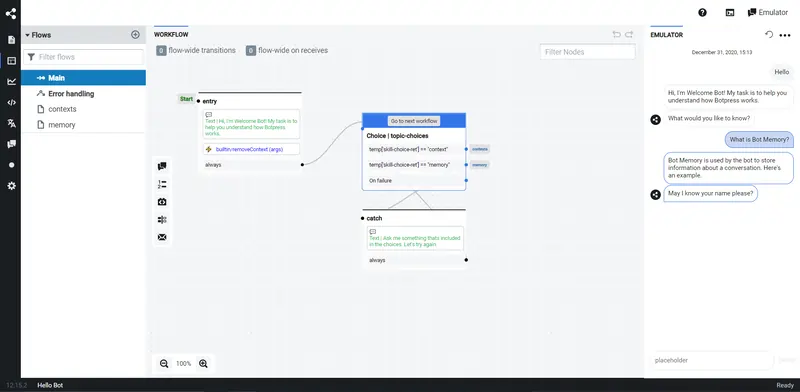
Security Features
TL;DR: Though Manychat has strong security features, Botpress offers stronger enterprise-grade security features.
Both Manychat and Botpress include essential security measures, but they differ significantly in how deeply they support enterprise-level security and compliance.
Manychat is designed for marketers focused on social media engagement. Because it’s aimed at less sensitive use cases, Manychat offers core security protections like data encryption and SOC 2 compliance but lacks advanced security features required by larger enterprises, such as data residency options.
Because Botpress is built to support a wider range of business applications – including use cases involving sensitive or regulated data – it offers more comprehensive security, including robust access controls and custom security policies.
Here’s how Manychat and Botpress compare for security:
Data Training
TL;DR: Manychat handles simple, flow-based conversations without document uploads or large knowledge bases. Botpress supports complex data handling, including document uploads, APIs, and dynamic knowledge sources for more advanced chatbot workflows.
Manychat includes AI features that generate natural-language responses, but these work within predefined flows, rather than training bots on large datasets or documents. Manychat doesn’t support uploading documents or building deep knowledge bases, so it’s limited when it comes to knowledge retrieval or any use case that requires more context.
Botpress offers more advanced options for working with data. Users can upload documents, create knowledge bases, and connect to APIs to pull in live information. Botpress can handle various data formats, like spreadsheets, JSON files, and unstructured text. It also has tools for training chatbots to manage conversations that involve context switching and complex logic.
Customization & Flexibility
TL;DR: Botpress offers significantly more flexibility than Manychat, especially for teams that need to write custom code. Manychat is easier to use but limited in customization.
Custom logic and coding is one of the biggest differences between Manychat and Botpress.
Manychat focuses on ease of use with a no-code drag-and-drop builder. Users can build conversation flows and integrate with other tools through webhooks and APIs. However, Manychat doesn’t allow adding custom code directly into flows.
Botpress provides a visual flow builder for creating chatbots without coding. But it goes further than Manychat by letting developers write custom code in JavaScript or TypeScript and connect to APIs. This makes Botpress adaptable for teams that need full coding flexibility for more sophisticated projects.
Community & Support
TL;DR: Manychat is a good choice if teams want strong marketing-focused resources and a large community. Botpress is better suited for users who want more developer-focused communities and personalized support for larger deployments.
Manychat offers a detailed Help Center, video tutorials, and Manychat Academy for learning how to build and optimize chatbots. It has a large Facebook community of 100,000+ members, where users share tips and solve problems together. Manychat provides email support, and paid plans include live chat assistance for faster help.
Botpress maintains a large Discord community of 30,000+ members, where users can get real-time help and collaborate with other developers. Botpress also runs daily Ask Me Anything sessions. Beyond its community channels, Botpress offers a YouTube channel with tutorials and Botpress Academy for structured learning. For businesses on Team and Enterprise plans, Botpress provides personalized support through its Customer Success team.
Which platform is better for my business?
Mid-Market SaaS Company Scaling Customer Support
Key problem: Handling high volumes of customer questions while keeping response times fast
Jess leads the customer experience team at a growing SaaS startup. With product adoption rising, her small team is overwhelmed by repetitive tickets — password resets, onboarding questions, billing clarifications. She’s under pressure to reduce support volume without expanding headcount. Her goals include:
- A chatbot that can answer frequently asked questions accurately
- Smooth handoff to live agents when needed
- Maintain fast response times as the business scales
- Integrate with their help center and CRM
Botpress uses AI to understand varied customer questions, even when phrased in different ways. This makes it more effective at reducing repetitive workload for Jess’ team, as the bot can handle unexpected queries without always needing human intervention. Plus, Botpress offers a wider range of integrations, so Jess could automatically update customer records in a CRM or trigger follow-up actions like personalized discounts – all of which help keep response times fast.
Manychat helps businesses like Jess’ manage high volumes of repetitive questions by letting them build customer service chatbots that quickly respond to common inquiries like shipping times or return policies. It’s especially useful for handling these conversations on social media channels such as Facebook Messenger and WhatsApp. However, because Manychat relies on predefined flows, it’s better for predictable questions rather than customer support issues.
Ultimately, Botpress is the better option for AI in customer service if Jess wants AI chatbots that can manage more complex conversations and integrations.
B2B SaaS Marketing Team Revamping Lead Gen
Key problem: Converting website visitors into qualified leads
Sophia runs demand generation for a B2B SaaS company. Her site gets traffic but few conversions. Forms underperform, and the sales team wastes time on weak leads. Her goals:
- Turn more visitors into leads through chat
- Qualify leads with follow-up questions
- Pass good leads straight to HubSpot
- Offer personalized paths based on user input
Botpress is a great platform to use for lead generation. Lead generation chatbots can guide visitors through personalized conversations and ask follow-up questions based on earlier answers, score leads, and connect with CRMs like HubSpot to automatically hand off high-quality leads to sales.
Manychat is effective for capturing leads through website chat widgets. It’s a good choice for businesses that want a simple way to ask basic questions and collect contact info. But it’s important to note that Manychat mostly handles straightforward lead capture and basic follow-ups rather than advanced qualification.
When it comes to AI lead generation, Botpress is a better fit for businesses like Sophia’s that want smarter lead scoring and more detailed integrations.
Consumer Brand Driving Conversions Through Social Media
Key problem: Turning social media followers into customers
Alex manages digital marketing at a DTC skincare brand. His team has built strong Instagram and Facebook followings, but turning that engagement into revenue is a challenge. He needs to:
- Start conversations with followers through DMs
- Recommend products based on user preferences
- Capture leads and send discount codes
- Follow up through Instagram and Messenger
Manychat is great for capturing leads directly through social media chats and handling simple marketing tasks. It works well for businesses that want an easy way to talk to followers on Instagram, Facebook Messenger, or WhatsApp, collect contact info, and send follow-up messages.
Botpress can also handle social media marketing scenarios, both through AI chatbots and digital marketing AI agents. Botpress lets businesses integrate conversations on social media that adjust based on what users say and connect with CRMs like Salesforce or HubSpot to pass leads automatically to sales. It’s a good fit for teams that need more customized chat experiences and more system integrations.
In the scenario of social media marketing, both Manychat and Botpress are solid platforms. Manychat is a great choice if Alex wants to engage social media audiences quickly with simple, no-code chatbot flows and collect leads efficiently. Botpress is the better option if he needs advanced personalization and integrations to turn social interactions into high-quality sales opportunities.
The Bottom Line: Botpress vs ManyChat
Botpress and Manychat are both strong platforms for chatbot marketing, but they’re built for different kinds of teams.
Manychat is great if users want to build marketing-focused chatbots quickly without coding. It’s great for engaging audiences on social media and running simple campaigns, but it can feel limited if teams need more complex logic or deep system integrations.
Botpress is all about flexibility and control. Instead of sticking to predefined flows, it gives developers the tools to build AI chatbots tailored exactly to their business processes, data sources, and integrations.
FAQs
1. Which platform offers better support for regulated industries like healthcare or finance?
Botpress offers better support for regulated industries like healthcare or finance because it includes enterprise-grade security features such as data residency options, role-based access controls, audit logs, and on-premise deployment. Manychat, while secure for marketing use cases, lacks advanced compliance support (like SSO integrations), making it less suitable for sensitive or regulated environments.
2. How well do Botpress and Manychat handle follow-up questions that go off-script?
Botpress handles follow-up questions that go off-script more effectively because it uses large language models and retrieval-augmented generation (RAG) to dynamically understand and respond to user input. Manychat relies on rule-based flows and keyword triggers, which makes it less adaptable to unscripted or unexpected queries unless manually configured.
3. Can chatbots built on either platform personalize conversations based on user behavior or past interactions?
Chatbots built on Botpress can personalize conversations using persistent memory across sessions, enabling them to recall user preferences and prior interactions. Manychat supports session-based personalization using tags and custom fields but does not natively store long-term memory unless integrated with external CRMs or databases.
4. Does either platform support A/B testing for conversation flows or marketing messages?
Manychat supports basic A/B testing by using flow variations and tracking engagement manually or through integration with analytics platforms. Botpress does not offer built-in A/B testing, but it gives developers more control to create testing logic or integrate with external A/B testing tools through custom workflows.
5. Do Botpress or Manychat offer built-in lead scoring tools?
Neither Botpress nor Manychat has native lead scoring tools built-in, but Botpress allows teams to build lead scoring logic using custom code or API integrations with CRMs like Salesforce or HubSpot. Manychat offers basic tagging and segmentation, but full lead scoring typically requires connecting to an external system.
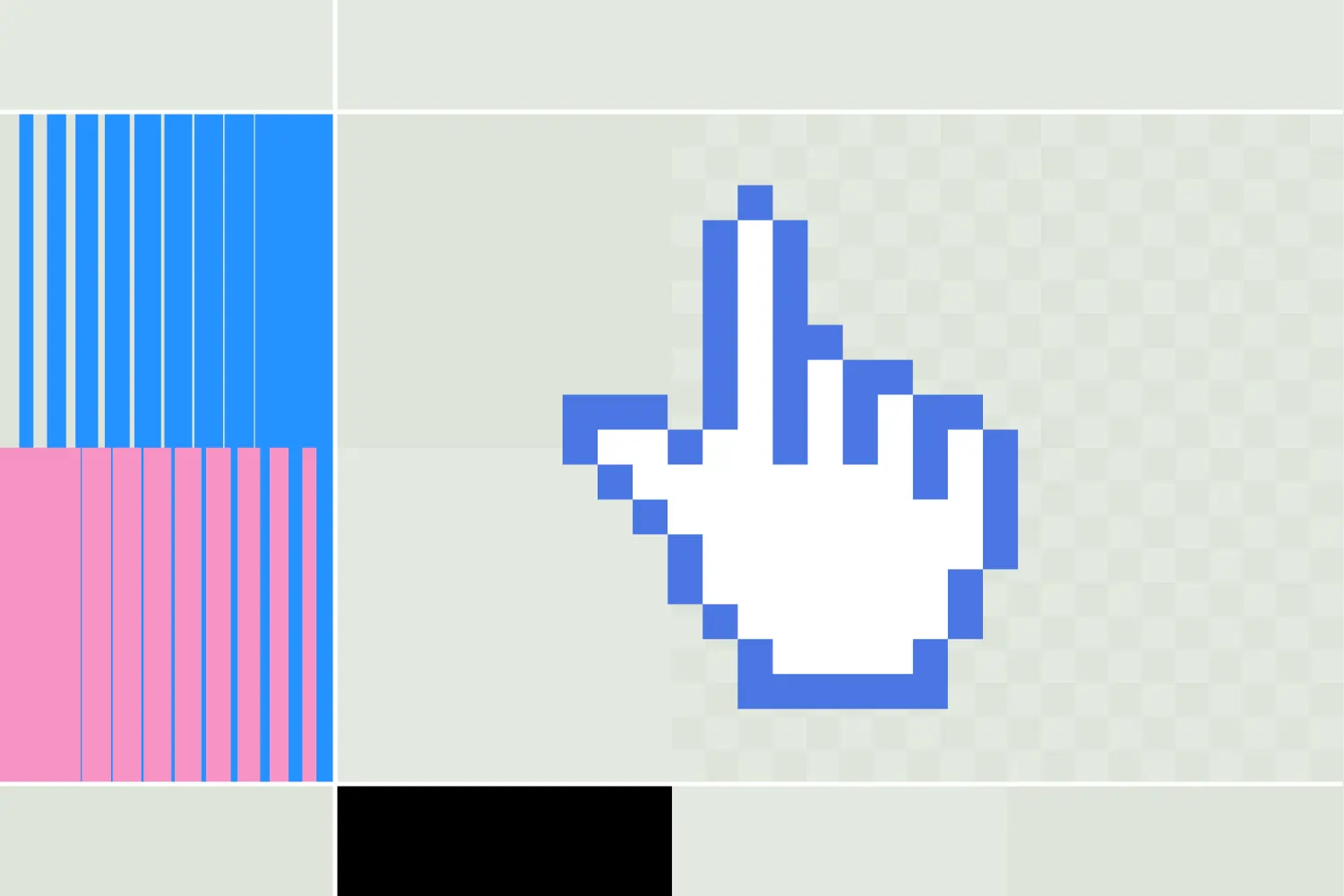




.webp)

